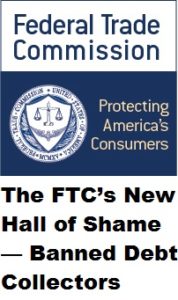By: Robert J. Nahoum
The Federal Trade Commission (FTC) is the “nation’s consumer protection agencyâ€. Among its many duties, the FTC enforces federal debt collection laws known as the Fair Debt Collection Practices Act (FDCPA for short). The FDCPA regulates the conduct of third party debt collectors and prohibits them from using abusive, unfair, or deceptive practices to collect from you.
On its blog, the FTC has published its “hall of shame†– a list of banned debt collectors whom the FTC has shut down for violations of the FDCPA and other wrong doing.
According to the post:
“there’s the ‘A List,’ and then there’s the ‘D List.’ I know which one I don’t want to be on.
Now the FTC has its own version of the ‘D’ List — its list of banned debt collectors.
Consumer complaints to the FTC about abusive debt collectors have more than doubled over the past seven years, coming in second only to identity theft, which has held the top spot for more than 14 years.
The law is clear: debt collectors can’t use abusive, deceptive, or unfair practices. Debt collectors who cross that line will end up in trouble with the FTC. Some are fined, punished, promise to comply with the law going forward, and are monitored by the FTC to make sure they do. But the behavior of other debt collectors gone bad is so egregious that the FTC asks the courts to permanently ban them from participating in the debt collection business.
As this list highlights, the FTC has been cracking down on illegal debt collection practices. In 2014, the FTC:
- filed 10 new cases against 56 new defendants;
- resolved nine cases and secured nearly $140 million in judgments; and
- banned 47 companies and individuals from the debt collection business.
 Since January 1, 2010, the FTC has sued over 180 companies and individuals who broke the law, banning 63 from the industry, and securing more than $220 million in judgments.
It’s important to understand your rights if you’re contacted by a debt collector. And if you believe a collector has violated those rights, the FTC wants to hear about it. Your complaint gives us a lead to follow, and may stop a collector from mistreating someone else. Got a minute? Watch our short video about Dealing with Debt Collectors.â€
In addition to the FTC’s authority to sue unscrupulous debt collectors, the FDCPA includes a private right of action under which a consumer can sue a debt collector for FDCPA violations. If a debt collector is found to have violated the FDCPA, the consumer may recover up to $1,000.00 in statutory damages, plus actual damages (for example pain and suffering) and most importantly, your reasonable attorneys’ fees. Like many other consumer protection laws, the FDCPA is what is called “fee shifting†– meaning that the obligation to pay the consumers attorneys’ fees shifts to the debt collector.
Because the FDCPA is fee shifting, most good consumer lawyers don’t charge their clients any out of pocket money. The attorneys’ fees are generally agreed upon in a settlement or awarded by the court or a jury.
If you need help settling or defending a debt collection law suit, stopping harassing debt collectors or suing a debt collector, contact us today to see what we can do for you. With office located in the Bronx, Brooklyn and Rockland County, the Law Offices of Robert J. Nahoum defends consumers in debt collection cases throughout the Tristate area including New Jersey.
The Law Offices of Robert J. Nahoum, P.C
(845) 232-0202

